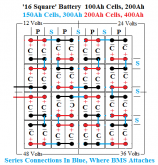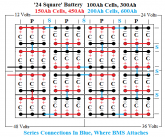But isn't THAT actually a message in itself? LOL
I build a lot industrial machines, and the rule is, sacrifice the cheap parts, and have a plan for total disaster.
Life & Limb come first, then saving as much of the unit/system as possible.
*IF* your panel/panels are screwed directly to the common posts on a charge controller, then you have no management of the panels,
Which is just fine *IF* the system is small enough & fairly well balanced.
Just keep in mind that everything is directly connected and any problem in any panel will get fed by the other panels this way.
Most panels have bypass diodes built into them, so you get some level of protection passively.
I fuse (easy to use and cheap fuses) at the panel combiner.
No excuse for NOT doing this, there are even MC4 inline fuses available for cheap.
A little 'Waterproof' box is about $10, and since the panels are fairly low amps at this point, it's a good place for small, cheap reversion diodes and little fuses, also dirt cheap.
It's panel management, which you don't get with the MC4 connector stuff.
Makes panel reconfiguration MUCH easier since you aren't messing with MC4 splitters/combiners 'On Order' when you want to do something different, and you don't have to chase all those little connections down to find a problem.
I use breakers in the Combiner box, since as the name suggests, the power goes up considerably when everything combines headed for the charge controller.
I know 'Technically' a breaker isn't a rated Disconnect, but it works for 99% of people, and breakers kill two birds with one stone that way.
Isolation isn't discussed at all that I can tell past 'Blocking' to stop reversion at night, the battery heating the panels.
Charge controllers won't allow that now so it's not well understood,
Isolation between panel strings so the rest of the panels can't cook a bad panel cell or panel string in larger systems is something I have seen personally.
Older, lesser panels being cooked when the charge controller shuts down, Voc issue, and in short order, when everything is combined,
Smaller/Lesser panels directly connected at the combiner box, there is no such thing as Voc, the smaller/lesser panels become Resistance Load to the rest of the panels, and it's an unregulated Vmp problem for the lesser.
People with all brand new matched panels with bypass diodes in place won't have this issue, but as you expand, or as panels age, I will guarantee it will pop up.
As for the discussion on WHERE to put protections,
As close to production source as is practical.
It takes about 5 minutes & $1 to put a fuse in the positive line box on the back of the panel.
In a panel combiner box, again, about $1 per fuse, and all the fuses are in one place.
Any given panel WIRING is compromised, the fuse saves the WIRING to the combiner box, and potentially the panel.
The circuit breakers in combiner box save the WIRING between combiner and panels.
Keep in mind the 'Production Source' becomes Load at night, and any issues in switching/routing CAN charge the panels at night.
Again, that breaker is a disconnect for the panel string without disconnecting the entire panel bank/array.
Once combined, the Vmp changes again, so it's time for another breaker between combiner buss and charge controller.
Consider this a 'Main Breaker' or Disconnect so the charge controller/controllers can be serviced.
The charge controller has 'Blocking' or Anti-Reversion protection before the 'Battery Out' line, but the charger battery line is also full time 'Hot'.
It's up to you how to deal with this.
*IF* my charger line goes directly to battery power, it gets a breaker.
*IF* my charger line goes to the inverter connection, it's covered by the main battery breaker/disconnect, and these runs are generally very short in my builds and often doesn't get a dedicated breaker.
Battery Breakers are always as close to battery source as possible, and there might be one connection directly to the batteries,
Fire detection & counter measures.
I build in automatic disconnect for everything but fire, if the fire alert is tripped, the battery and panels are automatically disconnected and the circuits are held open by the battery, as well as battery powering these circuits so there is no chance of interruption.
It's the last ditch, SCRAM the system to save the system counter measures.
I will sacrifice the system to save life & limb.
It's all in what you want to do, none of it is difficult, and when you consider the cost of a big system, a $200 high amp contactor is cheap to save Life & Limb, and 'SCRAM' the system to try and save as much as possible in the even of something catastrophic.






